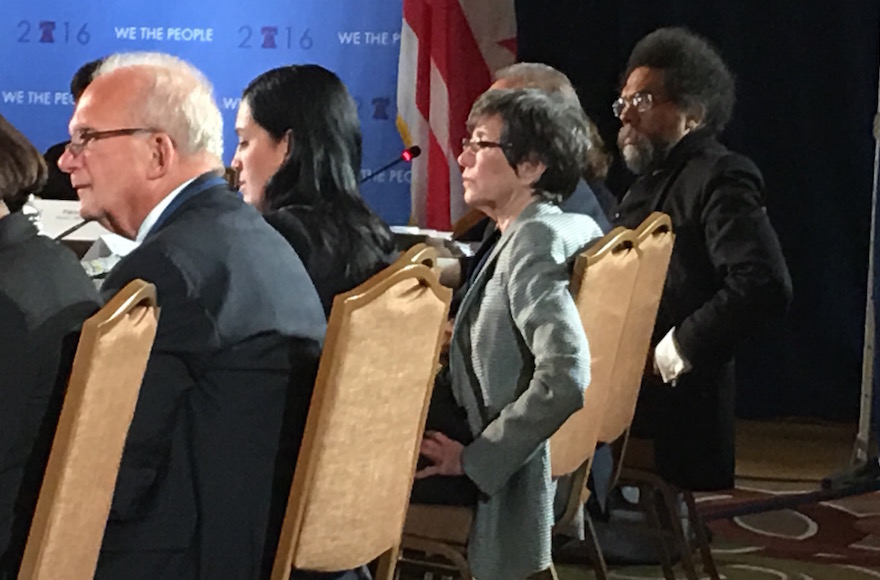Dem platform recognizes Palestinian aspirations, rejects ‘occupation’ language
Published June 26, 2016

Former Congressman Howard Berman, left, and Cornel West, at right, listening to testimony at a Democratic Party platform drafting committee hearing in Washington, D.C., June 9 2016. (Ron Kampeas)
WASHINGTON (JTA) — Democrats altered their platform to reflect Palestinian aspirations but rejected language calling for Israel to end its occupation of the West Bank and settlement activity.
ADVERTISEMENT
According to an Associated Press report emailed to reporters late Saturday by the Bernie Sanders campaign, the platform calls for a two-state solution but does not frame it purely as an outcome that benefits Israel, as previous platforms have.
It declares that achieving Palestinian statehood would provide “the Palestinians with independence, sovereignty, and dignity.”
The platform drafting committee of the Democratic National Committee met in cities across the country. The meeting this weekend, which wrapped up the draft and where the Israel-related language was approved, was held in St. Louis. The full platform committee will vote on the draft on July8-9 in Orlando.
The committee rejected language proposed by James Zogby, a Sanders appointee to the committee and the president of the Arab American Institute, that called for “an end to occupation and illegal settlements”.
Zogby said Sanders, the Vermont Independent Senator and the first Jewish candidate to win major nominating contests, helped draft the rejected language.
ADVERTISEMENT
According to tweets by Josh Ruebner, the policy director of the US Campaign to End the Israeli Occupation, who was monitoring in real time the St. Louis meeting of the platform drafting committee, Zogby’s language was defeated around midnight Friday 8-5.
Speaking against Zogby’s language were Wendy Sherman, a former deputy secretary of state and an appointee named by Hillary Clinton, the presumptive Democratic presidential nominee, and Howard Berman, a former California congressman who was named to the committee by Rep. Debbie Wasserman Schultz, D-Fla., the DNC chairwoman. Advocating for the language was Cornel West, a Sanders appointee and a philosopher who backs the boycott Israel movement.
Keeping out language that could potentially alienate the pro-Israel community was a priority to the Clinton campaign. Earlier this week, Jake Sullivan, her senior foreign policy advisor emailed JTA to say that “Hillary Clinton’s steadfast support for Israel, and the importance of the U.S.-Israel relationship, are well known. As we have said previously, she remains confident that the party platform will reflect her views.”
Clinton has secured enough delegates to win the first round of voting at the convention in Philadelphia next week. Sanders, unusually for a candidate who is set to lose, was given five spots on the platform drafting committee, a reflection of the strength of his campaign. Clinton named six and Wasserman Schultz the remaining four.
Zogby and another Sanders appointee to the committee who advocates for Palestinian rights, Rep. Keith Ellison, D-Minn., seemed happy with the overall platform, saying Sanders scored wins on his proposal to raise the minimum wage to $15 an hour, break up biug banks and expand social security.
“We got some great stuff in the platform that has never been in there before,” Zogby told AP.
J Street, the liberal Jewish Middle East policy group, praised the Israel-related language.
“The new language breaks with the party’s practice of framing its aim of establishing a Palestinian state solely in terms of Israel’s interests,” it said in a statement. “By including parallel acknowledgement of Israeli and Palestinian rights, the party underscores its belief that the only viable resolution to the conflict–a two-state solution–requires recognizing the fates of the two-peoples are intertwined.”














